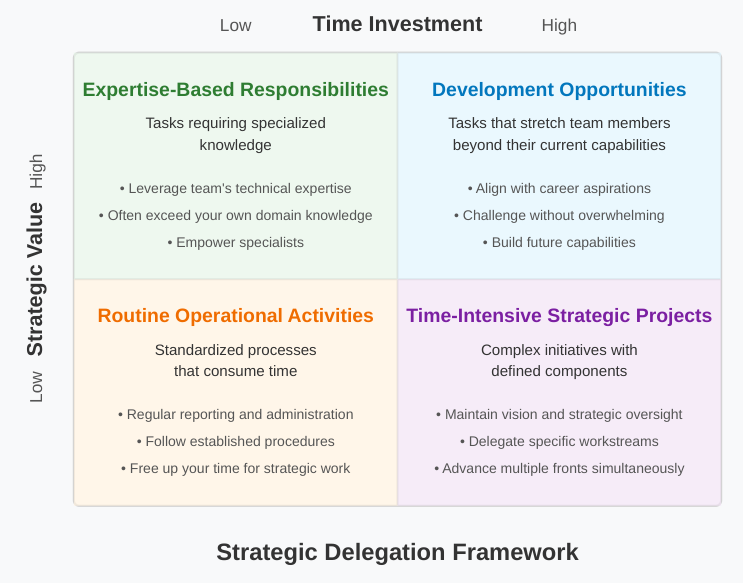This is Leadership Lessons, your blueprint for practical leadership success with actionable advice on how to excel as a manager, like how to learn from your mistakes.
Leaders who struggle to delegate effectively often find themselves trapped in a paradox: they're simultaneously overworked yet underperforming in their most crucial strategic responsibilities. The most transformative realization in a leader's development isn't learning what additional tasks to take on—it's discovering precisely what to let go.
Effective delegation represents far more than a time management technique. It serves as a strategic multiplier that enhances team capability, develops future leaders, and allows you to focus your expertise where it generates maximum value. While many leaders conceptually understand delegation's importance, the critical challenge lies in identifying exactly what responsibilities to delegate and to whom.
Why Delegation Matters
Delegation creates value on multiple levels simultaneously. When executed strategically, it distributes authority across your organization, accelerates the professional development of your team members, and enables you to concentrate your efforts on responsibilities that genuinely require your unique perspective and expertise.
Previously, I examined how delegation transforms organizational culture by building capability at every level. As I noted then, "Delegation is not just about distributing tasks; it's about building leaders." Each delegated responsibility becomes a developmental opportunity—a chance for team members to stretch their capabilities, demonstrate their potential, and prepare for greater leadership challenges.
"Trust your people to make decisions, and enable them to do so without coming to you for approval over every little thing." This principle has guided my approach to leadership for years. When you delegate effectively, you're not simply assigning tasks; you're extending trust and communicating confidence in your team's abilities. This trust forms the foundation upon which high-performing teams are built.
Distributed Leadership Through History
The Roman Empire provides one of history's most instructive case studies in effective delegation at scale. At its height, Rome controlled territories spanning from Britain to the Middle East—an area impossible to manage through centralized control given the communication limitations of the ancient world.
The genius of the Roman military system was its sophisticated delegation framework built around the legion structure. From the legatus (general) down through various officers to the centurions who led units of 80-100 men, Rome created a precisely calibrated hierarchy where each level held clearly defined decision-making authority.
A centurion wasn't merely an order-taker; he was an empowered leader responsible for training, discipline, tactical decision-making, and maintaining morale. The Romans understood that battlefield conditions required leaders who could make independent decisions aligned with strategic objectives without constantly referring questions up the chain of command.
I experienced a modern parallel during my time at Amazon, overseeing a large team across multiple departments. Initially, I attempted to maintain direct oversight of all critical processes—a strategy that quickly proved unsustainable. Following Rome's example, I developed capable team leaders with clearly defined authority boundaries, invested in their training, and established communication protocols that balanced autonomy with accountability.
The results were transformative. Our team's ability to respond to unexpected challenges increased dramatically, operational efficiency improved, and team member engagement strengthened. Like the Roman legion, we created a system where leadership wasn't concentrated in a single person but distributed appropriately throughout the organization.
The lesson? As the Roman historian Tacitus observed, great systems outlast great individuals. By developing strong delegation practices, Rome built an organizational structure that could withstand the variable competence of individual emperors and generals. Similarly, in our organizations, effective delegation creates resilience and scalability that transcends the capabilities of any single leader.
Four Categories for Decision-Making
Through years of leadership experience, I've refined a framework that helps identify which responsibilities to delegate and which to retain. This framework organizes tasks into four distinct categories:
1. Development Opportunities: Capability-Building Assignments
These responsibilities stretch team members beyond their current capabilities, requiring them to develop new skills or exercise greater judgment than they typically would.
What to look for: Tasks that align with a team member's career aspirations, natural aptitudes, or development needs. These opportunities should challenge without overwhelming.
Consider identifying a team member with strong analytical abilities but limited presentation experience and delegating the task of analyzing department performance metrics and presenting findings to leadership. While they might initially feel anxious about presenting to senior managers, the assignment develops capabilities that can accelerate their career advancement.
2. Expertise-Based Responsibilities: Leveraging Specialized Knowledge
These tasks require specialized knowledge or technical skill that exists within your team—often at levels exceeding your own expertise in that specific domain.
What to look for: Areas where team members possess deeper technical knowledge, more recent hands-on experience, or specialized training.
Delegation isn't abdicating responsibility; it's strategic. Maintain oversight of safety protocols, business metrics, and cross-functional coordination while empowering those with the right expertise to make the technical decisions they're best qualified to make. This approach not only improves process efficiency but also increases engagement among team members who feel their expertise is genuinely valued.
3. Routine Operational Activities: Necessary but Not Leader-Specific
These tasks involve standardized processes that consume time without requiring your unique leadership perspective or authority.
What to look for: Regular reporting, standardized analyses, routine communications, or administrative tasks that follow established procedures.
In my post on prioritization, I emphasized that leaders must focus on what truly matters. Delegation of routine tasks creates the cognitive and temporal space required for strategic thinking and high-value activities that only you can perform.
4. Time-Intensive Strategic Projects: Maintaining Vision While Sharing Execution
These are substantial initiatives that align with strategic priorities but contain components that can be effectively executed by others under your guidance.
What to look for: Complex projects with well-defined sub-components that can be assigned to team members while you maintain oversight of integration and strategic alignment.
For strategic improvement initiatives, maintain direct involvement in stakeholder management and strategic direction while delegating specific workstreams to team members based on their expertise and development goals. This approach allows projects to advance on multiple fronts simultaneously while ensuring all components remain aligned with your strategic objectives.
Delegation creates space for the strategic work I discuss in this post on balancing short and long-term goals.
The Non-Delegable Core
Understanding what to retain is equally important as knowing what to delegate. Generally, leaders should maintain direct responsibility for:
Strategic Direction and Vision: The core "why" and "where" questions that guide organizational action
Critical Stakeholder Relationships: Connections with key clients, investors, or partners that require your authority or historical relationship
Significant Performance Issues: Direct intervention in serious performance problems that could impact team culture or results
Confidential or Sensitive Matters: Information with legal, ethical, or privacy implications
Final Accountability: While authority can be delegated, the ultimate accountability for outcomes remains with the leader
New managers often make the mistake of delegating based on personal preference rather than strategic value. They delegate tasks they dislike while retaining activities they enjoy—regardless of where their unique leadership contribution truly matters most.
This approach fundamentally misunderstands delegation's purpose. Strategic delegation isn't about comfort or convenience; it's about organizational effectiveness and leadership multiplication.
The Trust Equilibrium
Effective delegation requires achieving the right balance between granting authority and maintaining appropriate oversight—what I call the "trust equilibrium." Delegating responsibility without corresponding authority creates frustration and inefficiency; granting authority without clear accountability generates unnecessary risk.
In last week’s post on trust and transparency, I explored how trust forms the foundation of high-performing teams. This principle applies directly to delegation. Team members must trust that you'll support them through challenges rather than abandoning them when difficulties arise. You must trust their judgment and capability to execute within established parameters.
This trust isn't built through words alone—it develops through consistent action. To permit irresponsible authority is to sow disaster. The solution isn't avoiding delegation but creating clarity around:
Decision Boundaries: Precisely what decisions can they make independently versus what requires consultation?
Resource Parameters: What budget, time, personnel, or other resources are available?
Success Metrics: How will performance be evaluated?
Communication Expectations: When and how should progress be reported?
Escalation Protocols: Under what circumstances should issues be elevated to your attention?
This structure provides the psychological safety that makes meaningful delegation possible. Team members can operate with confidence because expectations are transparent, while you maintain appropriate visibility without micromanaging.
I learned this lesson the hard way nearly a decade ago. I was leading a newly-formed organization and one of my responsibilities was developing new-hire training materials to standardize the onboarding process. I initially provided pretty minimal guidance to the pair of team members assisting with the project. Several weeks later, when checking on their progress, I discovered significant inconsistencies in the materials. This experience taught me that effective delegation isn't just about relinquishing control—it's about creating clarity that enables others to succeed.
Strategic Matching
The final element of effective delegation involves matching the right responsibilities to the right people—a process requiring thoughtful assessment of both the work requirements and individual team member attributes.
Consider these factors when making delegation decisions:
Current Capability Level: Does this person have the foundational skills necessary, or will they need significant support?
Growth Trajectory: Does this assignment advance their development in aligned directions?
Workload Capacity: Can they reasonably incorporate this responsibility given their existing commitments?
Interest and Motivation: Will they find this work engaging and meaningful?
Effective delegation isn't about distributing work evenly—it's about distributing it strategically. Different team members bring distinct strengths, interests, and development needs. By tailoring delegated responsibilities to individual team members, you maximize both their professional growth and the quality of outcomes.
From Theory to Practice
Here are eight practical steps to elevate your delegation effectiveness:
Conduct a Comprehensive Task Audit: Document all your recurring responsibilities and categorize them using the four-category framework. Identify at least three significant activities you currently perform that could be delegated to create capacity for higher-value leadership work.
Create Individual Capability Profiles: For each team member, document their current strengths, development priorities, demonstrated interests, and capacity limitations. Use these profiles to inform more strategic delegation decisions.
Implement Progressive Delegation: Begin with smaller, well-defined responsibilities to build your comfort with delegation and your team's confidence in handling expanded authority. Gradually increase the scope and complexity of delegated work as capability develops.
Establish Clear Delegation Protocols: When transferring responsibility, schedule dedicated handoff conversations to explain the assignment context, clarify expectations, provide necessary resources, and address questions. Document key parameters to prevent misunderstandings.
Define Decision Rights Explicitly: For each delegated responsibility, clearly articulate what decisions the team member can make independently, what requires consultation, and what remains outside their authority. This clarity prevents both overstepping and unnecessary escalation.
Create Structured Feedback Loops: After significant delegated tasks are completed, conduct brief retrospective discussions to identify lessons learned from both the task execution and the delegation process itself.
Develop Progressive Monitoring Systems: Establish appropriate oversight mechanisms based on the task complexity and team member experience. For newer team members or higher-risk activities, create more frequent check-ins; for experienced staff handling familiar responsibilities, implement lighter-touch monitoring.
Recognize and Celebrate Successful Delegation: Publicly acknowledge team members who excel with delegated responsibilities. This reinforces the organizational value placed on initiative and helps build a culture where delegation is viewed as an opportunity rather than a burden.
Building Your Leadership Legacy Through Others
Effective delegation represents one of leadership's most powerful multipliers. Beyond its immediate operational benefits, strategic delegation develops your organization's next generation of leaders. Your thoughtful delegation practices are the essential cultivation that develops leadership capability throughout your organization.
By systematically identifying what to delegate and creating the conditions for others to succeed, you transform delegation from a mere task management technique into a leadership development strategy with far-reaching impact. The most enduring leadership legacy isn't found in what you personally accomplish—it's reflected in the leaders you develop who continue driving success long after your direct involvement ends.
What aspects of delegation do you find most challenging? Share your experiences in the comments below.
Follow me on LinkedIn




